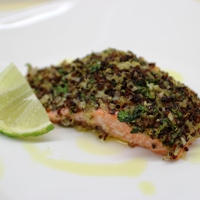
Vitamin D has captured headlines and store shelves thanks to some fascinating research studies. A hot news topic and a source of debate amongst scientists, eating foods rich in vitamin D and having higher blood levels of vitamin D have been linked to reduced risk of not only osteoporosis (weak bones) but also diabetes, multiple sclerosis and some types of cancer.
Here is your cheat sheet covering all you need to know about the sunshine vitamin:
What is vitamin D?
- Not technically a vitamin, it’s actually a group of hormones. No wonder all of its functions in the body are under investigation!
- Vitamin D is fat soluble, meaning it is stored up in your body. You also need some healthy fats in your diet to be able to absorb it.
- The type of vitamin D that is produced from sun exposure and is found in food has to be converted by the liver and the kidneys into the “active” form called calcitriol, the form your body can use.
Why do I need it?
- Why is vitamin D so important? It is needed to absorb calcium and phosphorus, which are required for strong bones. Vitamin D also helps reduce overall inflammation, improves muscle strength and increases immune function.
- Vitamin D has been making headlines because several research studies suggest that higher vitamin D intakes and higher blood levels of vitamin D may reduce risk of colorectal cancer. There are also studies that show no effect of vitamin D on cancer risk. Many studies have looked at vitamin D and calcium together, so it is unclear which nutrient provides the health benefits, or if it is both in combination.
How much do I need?
Quick tip: Check the % Daily Value on the Nutrition Facts label. It should say 20% DV for vitamin D to be considered a good source.
- Health Canada recommends that children and adults ages 9-70 years get at least 600 IU each day, and adults 71 years of age and older get at least 800 IU every day. However, these values are based on bone health and not some of the other health benefits that vitamin D offers. The Canadian Cancer Society recommends getting 1000 IU of vitamin D each day from food and supplements. This is what I suggest for most people.
- Experts haven’t settled on the ideal amount of vitamin D we should get each day. Unless your doctor or dietitian has told you that you need extra vitamin D, the upper limit is 4000 IU per day. I would suggest you not get more than this from food and supplements, because there have been reports of toxicity (health problems) from people who have gone above this level.
- Over the age of 50? Health Canada suggests a vitamin D supplement of 400 IU each day. To take this one step further – if you aren’t drinking milk, I suggest you take 1000 IU each day.
Where do I get vitamin D?
There are 3 options: sunshine, food sources or supplements.
It can be difficult to meet your vitamin D needs from sunlight, especially in Canada. Recommendations for cancer survivors and everyone else say that to prevent skin cancer, we should wear sunscreen. The drawback is that sunscreen also blocks vitamin D production. The older you are and the darker your skin, the more difficult it is for your body to produce vitamin D from sun exposure. All the more reason to include vitamin D-rich foods and supplements in your diet!
It is tough to get enough vitamin D from food because it isn’t found in many items. Fatty fish such as salmon and trout are excellent sources. Egg yolks and mushrooms also naturally contain vitamin D. In Canada, milk and some milk alternatives and margarine are fortified with vitamin D. Some yogurts may also be fortified. Check the label to be sure.
You may need to take vitamin D supplements if you aren’t getting enough from food. If you have low blood levels of vitamin D, weak bones (osteopenia or osteoporosis) or other health problems, you may need to take supplements. Ask your doctor to measure your vitamin D levels if you are concerned. Your dietitian or doctor can help you figure out if you need to take a supplement and how much you need.
What are good food sources of vitamin D?

Foods fortified with vitamin D in Canada:
- Milk
- Some yogurts (check the label to be sure)
- Fortified milk alternatives (check the label to be sure)
- Margarine
Foods that are natural sources of vitamin D:
- Fatty fish such as salmon
- Egg yolks
- Mushrooms
Looking for more?
Check out these recipes from
ELLICSR Kitchen featuring food sources of vitamin D and more nutrition notes:
More great resources on Vitamin D:
